ALSO BY ERIK LARSON
In the Garden of Beasts Thunderstruck The Devil in the White City Isaacs Storm Lethal Passage The Naked Consumer


Copyright 2015 by Erik Larson
All rights reserved.
Published in the United States by Crown Publishers, an imprint of the Crown Publishing Group, a division of Random House LLC, a Penguin Random House Company, New York.
www.crownpublishing.com
CROWN is a registered trademark and the Crown colophon is a trademark of Random House LLC.
Library of Congress Cataloging-in-Publication Data
Larson, Erik, 1954
Dead wake : the last crossing of the Lusitania / by Erik Larson.First edition.
p. cm.
Includes bibliographical references.
1. Lusitania (Steamship) 2. World War, 19141918Naval operations, German. 3. ShippingGovernment policyGreat BritainHistory20th century. I. Title. II. Title: Last crossing of the Lusitania.
D592.L8L28 2015
940.4514dc23 2014034182
ISBN 978-0-307-40886-0
eBook ISBN 978-0-553-44675-3
Maps: Jeffrey L. Ward
Frontispiece: Mary Evans/Epic/Tallandier
Jacket design: Darren Haggar
Jacket photography: Stefano Oppo/Getty Images
v3.1
For Chris, Kristen, Lauren, and Erin
(and Molly and Ralphie, absent, but not forgotten)
CONTENTS

MINING SUSPENSE
(A Note to Readers)
I FIRST STARTED READING about the Lusitania on a whim, following my between-books strategy of reading voraciously and promiscuously. What I learned both charmed and horrified me. I thought I knew everything there was to know about the incident, but, as so often happens when I do deep research on a subject, I quickly realized how wrong I was. Above all, I discovered that buried in the muddled details of the affairdeliberately muddled, in certain aspectswas something simple and satisfying: a very good story.
I hasten to add, as always, that this is a work of nonfiction. Anything between quotation marks comes from a memoir, letter, telegram, or other historical document. My goal was to try to marshal the many nodes of real-life suspense and, yes, romance that marked the Lusitania episode, in a manner that would allow readers to experience it as did people who lived through it at the time (although squeamish readers may wish to skip the details of a certain autopsy that appears late in the narrative).
In any event, I give you now the saga of the Lusitania , and the myriad forces, large and achingly small, that converged one lovely day in May 1915 to produce a tragedy of monumental scale, whose true character and import have long been obscured in the mists of history.
E RIK L ARSON
S EATTLE
A WORD ABOUT TIME : To avoid confusing myself and readers, Ive converted German submarine time to Greenwich Mean Time. Thus an entry in Kptlt. Walther Schwiegers War Log for 3:00 P . M . becomes 2:00 P . M . instead .
A S FOR B RITAIN S A DMIRALTY : It is important always to keep in mind that the Admiraltys top official was the First Lord, who served as a kind of chief executive officer; his second-in-command was First Sea Lord, essentially the chief operating officer, in charge of day-to-day naval operations.
The Captains are to remember that, whilst they are expected to use every diligence to secure a speedy voyage, they must run no risk which by any possibility might result in accident to their ships. They will ever bear in mind that the safety of the lives and property entrusted to their care is the ruling principle which should govern them in the navigation of their ships, and no supposed gain in expedition, or saving of time on the voyage, is to be purchased at the risk of accident . R ULES TO B E O BSERVED IN THE C OMPANY S S ERVICE , THE C UNARD S TEAM -S HIP C OMPANY L IMITED , M ARCH 1913

The first consideration is the safety of the U-boat. A DM . R EINHARD S CHEER ,
Germanys High Sea Fleet in the World War , 1919
A WORD FROM THE CAPTAIN
O N THE NIGHT OF M AY 6, 1915, AS HIS SHIP APPROACHED the coast of Ireland, Capt. William Thomas Turner left the bridge and made his way to the first-class lounge, where passengers were taking part in a concert and talent show, a customary feature of Cunard crossings. The room was large and warm, paneled in mahogany and carpeted in green and yellow, with two fourteen-foot-tall fireplaces in the front and rear walls. Ordinarily Turner avoided events of this kind aboard ship, because he disliked the social obligations of captaincy, but tonight was no ordinary night, and he had news to convey.
There was already a good deal of tension in the room, despite the singing and piano playing and clumsy magic tricks, and this became more pronounced when Turner stepped forward at intermission. His presence had the perverse effect of affirming everything the passengers had been fearing since their departure from New York, in the way that a priests arrival tends to undermine the cheery smile of a nurse.
It was Turners intention, however, to provide reassurance. His looks helped. With the physique of a bank safe, he was the embodiment of quiet strength. He had blue eyes and a kind and gentle smile, and his graying hairhe was fifty-eight years oldconveyed wisdom and experience, as did the mere fact of his being a Cunard captain. In accord with Cunards practice of rotating captains from ship to ship, this was his third stint as the Lusitania s master, his first in wartime.
Turner now told his audience that the next day, Friday, May 7, the ship would enter waters off the southern coast of Ireland that were part of a zone of war designated by Germany. This in itself was anything but news. On the morning of the ships departure from New York, a notice had appeared on the shipping pages of New Yorks newspapers. Placed by the German Embassy in Washington, it reminded readers of the existence of the war zone and cautioned that vessels flying the flag of Great Britain, or of any of her allies, are liable to destruction and that travelers sailing on such ships do so at their own risk. Though the warning did not name a particular vessel, it was widely interpreted as being aimed at Turners ship, the Lusitania , and indeed in at least one prominent newspaper, the New York World , it was positioned adjacent to Cunards own advertisement for the ship. Ever since, about all the passengers had been doing was thinking, dreaming, sleeping, and eating submarines, according to Oliver Bernard, a theater-set designer traveling in first class.
Turner now revealed to the audience that earlier in the evening the ship had received a warning by wireless of fresh submarine activity off the Irish coast. He assured the audience there was no need for alarm.
Coming from another man, this might have sounded like a baseless palliative, but Turner believed it. He was skeptical of the threat posed by German submarines, especially when it came to his ship, one of the great transatlantic greyhounds, so named for the speeds they could achieve. His superiors at Cunard shared his skepticism. The companys New York manager issued an official response to the German warning. The truth is that the Lusitania is the safest boat on the sea. She is too fast for any submarine. No German war vessel can get her or near her. Turners personal experience affirmed this: on two previous occasions, while captain of a different ship, he had encountered what he believed were submarines and had successfully eluded them by ordering full speed ahead.
Next page
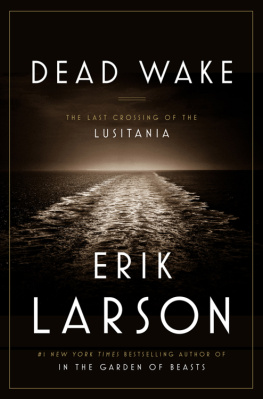

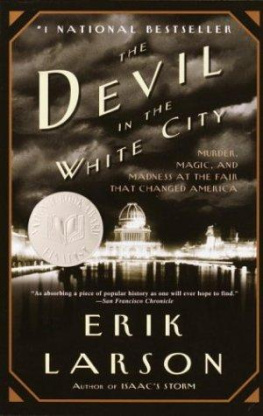
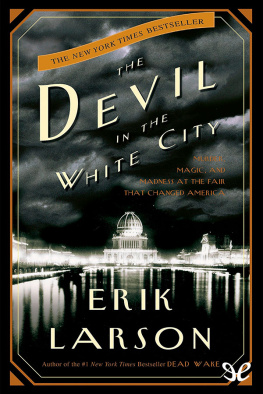


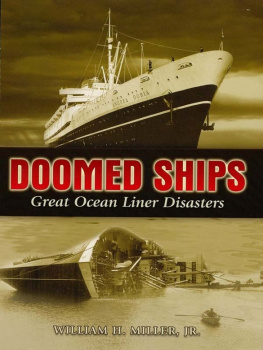
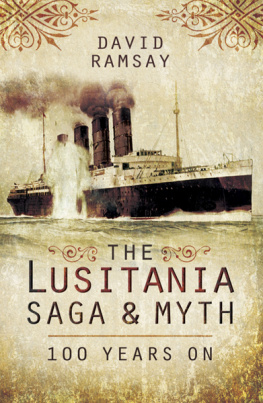
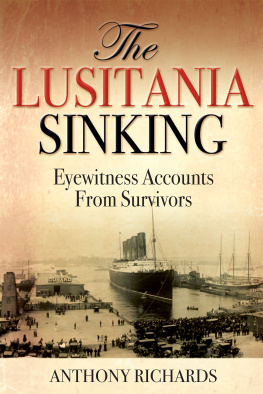
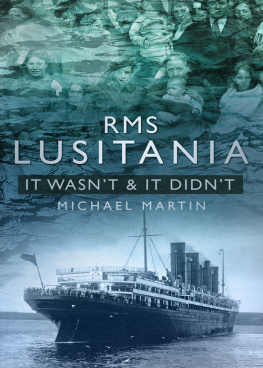
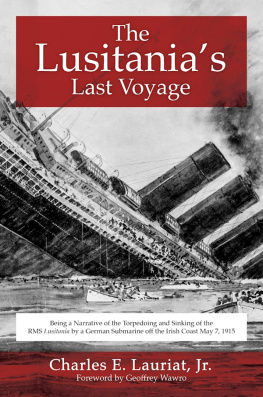
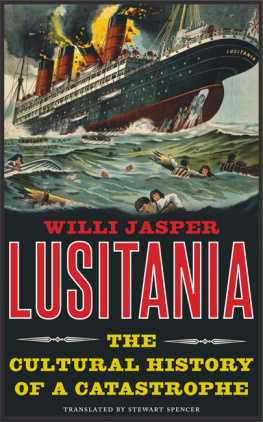
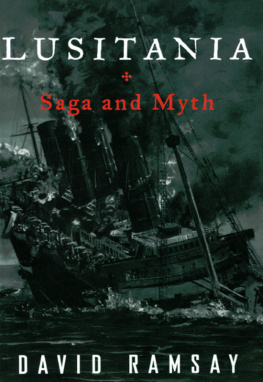

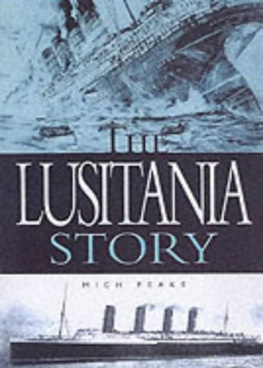
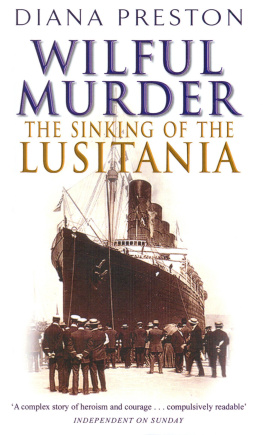



 The first consideration is the safety of the U-boat. A DM . R EINHARD S CHEER ,
The first consideration is the safety of the U-boat. A DM . R EINHARD S CHEER ,